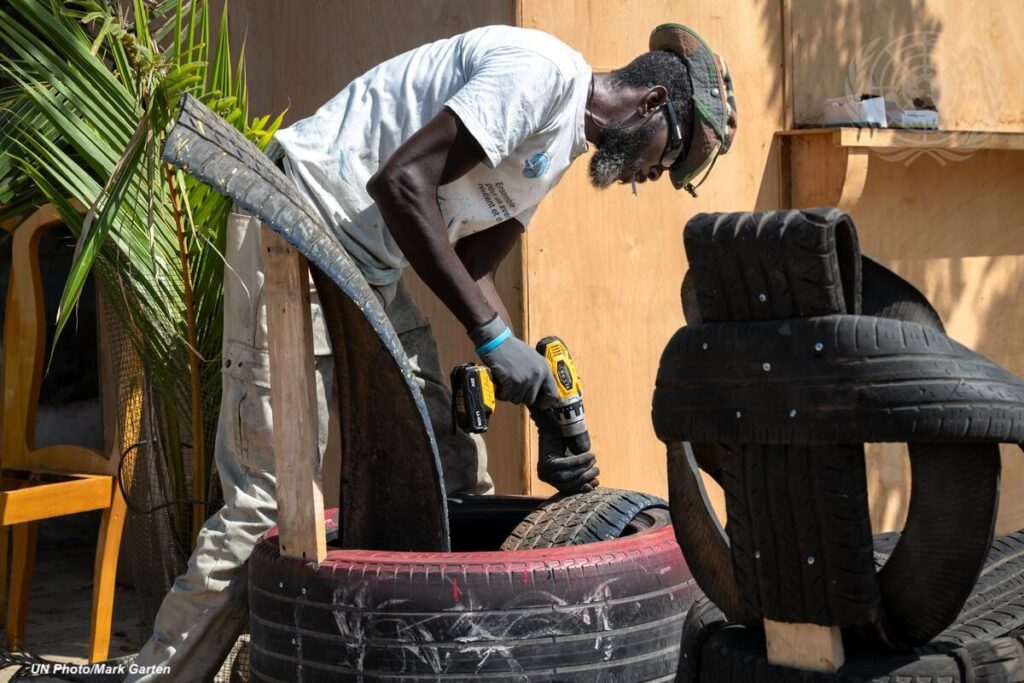Geneva/New York, April 24, 2025 – An estimated 60 percent of the world population are now feeling economically insecure in the face of global transformations that include escalating conflicts and climate change after decades of unprecedented improvement in material well-being, the World Social Report 2025 said.
The 119-page report said a recent study on life satisfaction showed that 60 per cent of people worldwide are struggling and 12 per cent are suffering, and over 690 million people live in extreme poverty, under $2.15 a day. It said over 2.8 billion, more than a third of the world’s population, live on between $2.15 and $6.85 a day with no guarantee of economic security.
“Even a small shock can send people into extreme poverty, and any escapes from poverty are often temporary,” the report said. “The recent crises and growing threats from climate change and conflict make the universal need to strengthen resilience even more pressing.“
Read the World Social Report 2025. Thematic papers supporting the World Social Report2025 are also available on the UN DESA website:
https://social.desa.un.org/issues/world-social-report/thematic-papers
It said almost 60 per cent of people worldwide fear of losing their jobs and not finding one and even workers with the possibility to join a secure middle class have found themselves struggling for economic stability. It said informal employment remains the most prevalent form of labor market participation in low- and middle-income countries.
“Despite early expectations that it would decline and eventually disappear with economic growth and development, the share of informal employment has remained stagnant in African countries and declined only slightly in Asian and Latin American countries since 2010.”
It said nearly one in five people worldwide is at high risk from climate-related disasters and one in seven people was exposed to conflict in 2024 as both shocking situations have exacerbated poverty and hindered efforts to alleviate it. The report cited several factors that contribute to the unprecedented social challenges, including:
Persistent inequality and exclusion – It said income inequality since 1990 has increased in most high-income countries and in some middle-income countries, including China and India. Countries where inequality has grown are home to two thirds of the world’s population. It said income in some countries of Latin America, Africa and Asia have declined over the last three decades, according to the Gini coefficient which provided a summary measure of income inequality.
“While it is still too soon to assess the full effect of the Covid-19 pandemic and other recent crises, the data available suggest that income inequality remained stable or even declined in the first years of the pandemic in several high-income countries.”
“Despite some positive trends, income and wealth are increasingly concentrated at the top. The share of income going to the richest one per cent of the population increased or remained stable, albeit at the high level of around 60 per cent, in countries with data from 1990 to 2022. The world’s richest one per cent of people today own more wealth than 95 per cent of humanity (Oxfam International, 2024). Ongoing global transformations are affecting these trends.”
Declining trust and weakening social cohesion – The report said social cohesion plays an important role in how people and social groups cooperate with one another to undertake collective action and maintain the rule of law. On the contrary, weakened social cohesion and growing polarization can impact on global agendas. It said the World Economic Forum has identified “societal polarization as one of the top five global risks in its two-year time horizon (WEF, 2025). People increasingly perceive politics and society in terms of “us” versus “them”. Growing hostility between social groups and increasing support for extreme political positions are fanning the flames of another top global risk: misinformation and disinformation.”
“While there is no broadly agreed data framework to measure all dimensions of social cohesion across countries, the available evidence shows that trust in institutions has declined in most countries with data since the late 1990s.”
The report said over half of the world’s people currently have little or no trust in their government.
It said the spread of misinformation and disinformation, facilitated by digital technologies, “is reinforcing divisions and fueling distrust. While digital platforms hold great potential to connect and inform people, they also allow the spread of disinformation, deceit and hate speech, often at a speed too fast to effectively counter. Social media has been leveraged to obstruct dialogue, incite violence, and stoke conflicts. Often, users find themselves immersed in virtual and siloed “echo chambers” where they are exposed to news and opinions that align with and may radicalize their views.” (By J. Tuyet Nguyen)
United Nations correspondent journalists – United Nations correspondent journalists – United Nations journalism articles – United Nations journalism articles – United Nations News – UNCA Awards

